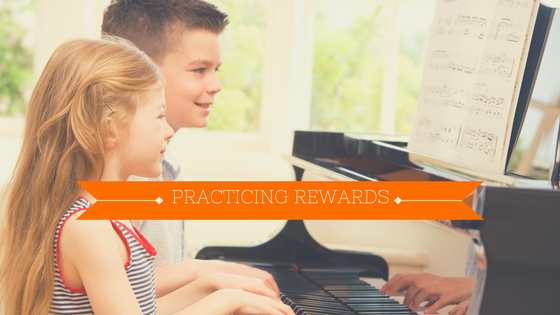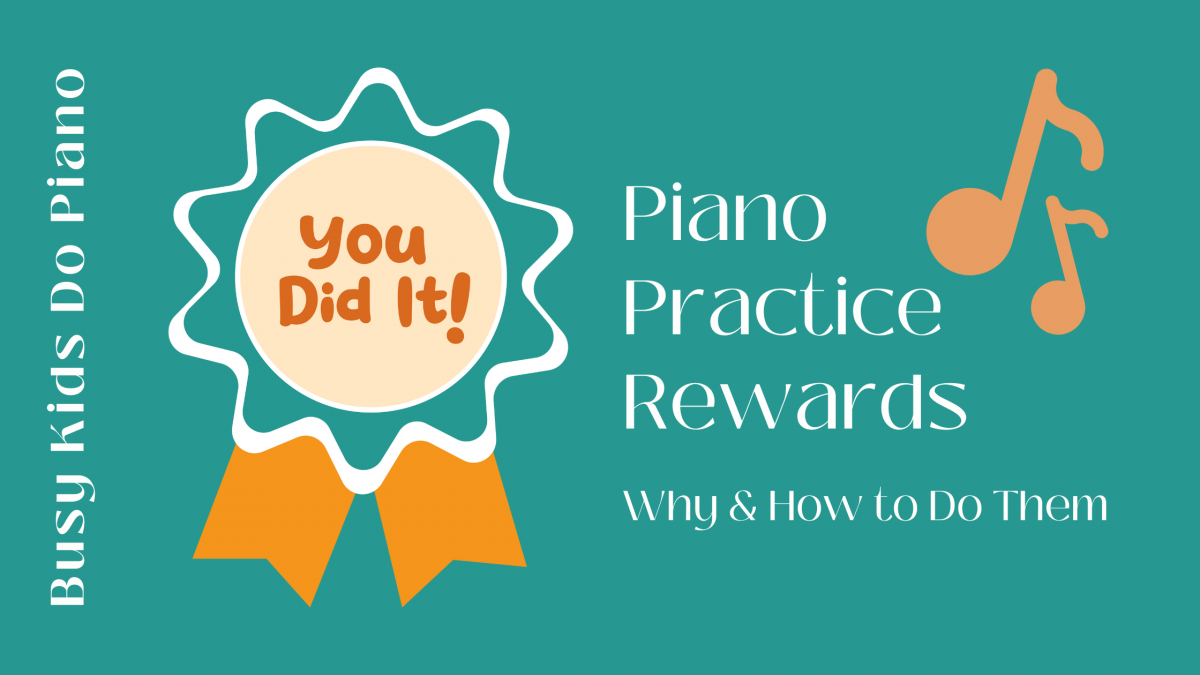If the idea of piano practice rewards causes you to cringe, let me tell you a story.
I once had a piano student who was incredibly bright and had so much potential as a pianist. When she first started lessons with me, she was excited about how easily things were coming to her and practiced ALL THE TIME. As a result, she progressed quickly and was confident in her abilities.
As she progressed, things became more challenging, and she grew frustrated. Rather than working through the frustrations between her lessons with me, she resisted practicing. After a few weeks of having what seemed like an identical piano lesson to the last as we worked through challenges in her music, I called her mom to ask how practicing was going at home.
“She’s not practicing,” her mom admitted truthfully. “And I’m not telling her to. I have really awful memories of my parents forcing me to practice trumpet and I only want her to practice piano so long as she is enjoying it.”
These sentiments are not unique to this parent. Throughout my years of teaching, I often have parents express to me that they don’t want to force their child to practice. Instead, these parents want their child to love playing so much that he WANTS to practice.
A noble goal, indeed. But here’s the thing…
At the beginning — and even in the “middle” — your student is likely not going to want to practice. This is not unusual or strange. One day, practicing will become its own reward and that is, certainly, the long-term goal.
When I have the chance to practice now as an adult, it is a GIFT. I love to play the piano and the organ and can sit down for 2-3 hours at a time to work on new music and play old favorites. This feeling of fulfillment and desire to play for the sake of playing took years to achieve. It was definitely not how I felt about sitting down to practice when I was 10 and wanted to be doing anything else.
So how do we GET our children to this point…this point of wanting to practice and having the act of playing their instrument serve as its own reward? How do we get them there without forcing the act of practicing upon them and constantly going to battle?
Rewards.
This might go against your parenting ideals. You might be horrified by this idea and wonder, “Are you telling me to bribe my kids?!” But I truly believe that at the beginning, students need piano practice rewards to help motivate and encourage.
Some piano practice rewards are a great long-term fix, and others might just be a short-term solution. Let’s dig deeper into how to set up an effective piano practice reward system.

SHORT-TERM PIANO PRACTICE REWARDS
Short-term rewards are rewards that might not have much to do with actually practicing the instrument. For example, you tell your student that before he can go outside and play, he must practice piano.
Right now I use two material, short-term rewards for my own children. My 5-year-old LOVES candy. When I tell him it’s time to practice trombone, I’m typically met with, “NOOOOOOO!! I DON’T WANT TOOOOOO!” (He’s very dramatic.) So I tell him that after trombone practice I will give him a jelly bean. He then rushes off to grab his practice binder.
My daughter loves playing Minecraft on the Kindle. We have a checklist of things she must do each day (read for 20 minutes, feed her rabbits, play outside, etc.) in order to earn Kindle time — and on that list is, you guessed it, practice piano. During the summer months when she doesn’t have school, she pops out of bed and gets to work on her checklist first thing in the morning so that she can earn her Minecraft time.
Both of these short-term material rewards are working really well for us right now. But I don’t expect that they’ll always do the trick. I can see my son getting bored of jelly beans and my daughter not really thinking Minecraft is all that exciting one day. When that happens, we’ll come up with some new short-term practice rewards that motivate them.
LONG-TERM PIANO PRACTICE REWARDS
We don’t just leave it to jelly beans and Minecraft to get our kids to practice. I strongly believe that long-term piano practice rewards can and should be related to the act of learning their instrument.
So what does that look like, exactly?
My son looooves Trombone Shorty. He would much rather watch a concert of his on YouTube and play along with him rather than practicing the rhythms and glissandos that his teacher assigns. So when we finish going through his “homework”, I let him watch a few Trombone Shorty songs on the TV and go nuts.
My daughter isn’t all that jazzed about working on scales and the pieces in her method books, but she loves “Let it Go”. After she finishes working through her practice assignments, I help her learn a few more measures of Elsa’s anthem.
When I was in elementary school, I despised learning classical music (it has since, become my favorite genre to play), but I was obsessed with songs from Phantom of the Opera. They were super challenging with crazy key signatures and rhythms, but my teacher wisely used them alongside my classical pieces to keep me motivated and excited about progressing.
In my piano classes, I often keep charts on display on the walls and place stickers on them when students practice 5 days during the week. Students enjoy seeing the public display of their achievements, and are motivated to practice and keep the column below their name sticker-filled.
Piano practice rewards related to playing piano might be a collection of songs from a favorite movie or musical. Try setting up a practice checklist or chart in a visible area of your home. When you are an active part of your child’s musical experience, you will pick up on his likes and dislikes and how you can be sensitive to what will work for him.
To sum up:
- Don’t be afraid to use piano practice rewards to support good practice habits
- Use short-term material rewards to motivate students to increase practice time
- Use rewards tied to the act of playing the instrument to motivate your student for the long-term





